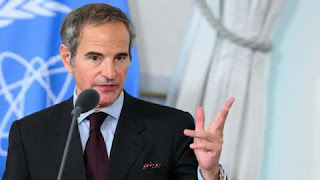Iran could be just months away from resuming uranium enrichment at weapons-grade levels, according to Rafael Grossi, Director General of the International Atomic Energy Agency (IAEA). His comments come in the wake of joint U.S.-Israeli airstrikes on key Iranian nuclear facilities.
In an interview with CBS News, Grossi emphasized that while the recent strikes inflicted notable damage, Iran retains the capacity to rapidly revive its nuclear program. "They still have the industrial and technological capacity," he said. "If they decide to, they could start again in a matter of months."
The coordinated attacks earlier this month targeted Iran's Fordo, Natanz, and Isfahan nuclear facilities. The offensive was launched by Israel on June 13, with the United States joining soon after. While some U.S. officials described the damage as "severe but not total," former President Donald Trump claimed the facilities were "completely destroyed"—a statement Grossi refuted, saying, “One cannot claim that everything has disappeared and there is nothing there.”
A leaked Pentagon assessment this week suggested the strikes had only temporarily set back Iran’s nuclear capabilities, mirroring Grossi’s warning. The full impact of the operation is still being evaluated.
Tensions between Iran and global institutions have escalated. Iran’s Supreme Leader Ayatollah Ali Khamenei dismissed the effectiveness of the airstrikes, though Foreign Minister Abbas Araghchi admitted they caused "serious and excessive" damage. In a retaliatory move, Iran's parliament voted to suspend cooperation with the IAEA, accusing the agency of siding with the U.S. and Israel. Iran has also denied IAEA inspectors access to the bombed sites.
Araghchi further criticized Grossi on social media platform X (formerly Twitter), calling his request to visit the damaged facilities “meaningless” and possibly “malign in intent.”
The strikes followed a recent IAEA finding that Iran had violated its nuclear non-proliferation obligations for the first time in two decades. Tehran continues to insist that its nuclear activities are for peaceful, civilian purposes only.
Despite rising hostilities, Grossi stressed the need for a diplomatic solution. “Ultimately, after all the military action, we’ll need a sustainable resolution—and that must be a diplomatic one,” he said.
Under the 2015 nuclear agreement with world powers, Iran agreed not to enrich uranium beyond 3.67% and was barred from enriching at the Fordo site for 15 years. However, after the U.S. withdrew from the deal in 2018 under Trump—arguing it failed to effectively prevent Iran from pursuing a bomb—Iran gradually scaled back its compliance, restarting enrichment at Fordo in 2021.
IAEA estimates now suggest that Iran possesses enough 60% enriched uranium to potentially build up to nine nuclear weapons if further enriched.
As regional tensions continue, Iran and Israel have tentatively agreed to a fragile ceasefire. Still, Trump has said he would "absolutely" consider renewed military action if Iran approaches weapons-grade uranium enrichment.
Source: BBC

Comments
Post a Comment